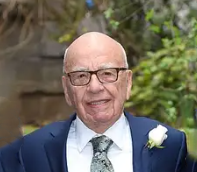With its force of inevitability, Rupert Murdoch’s story unfolds across continents and decades, resembling an epic about ambition and power. His empire, which encompasses publishing, broadcasting, and newspapers, is among the most striking examples of how inherited legacy can be transformed into unparalleled worldwide influence. He continues to be a symbol of how control over information can be transformed into incredible financial and political capital, with a net worth that hovers around $22 to $24 billion.
Sir Keith Murdoch, a distinguished war correspondent who recognized that newspapers could have just as much of an impact on governments as armies, was the father of Murdoch, who was born in 1931. Young Rupert was shaped into a man who would later revolutionize the way millions of people consume information by Keith’s almost instinctive mastery of sensationalist reporting. Rupert, who was well-groomed from birth, attended Geelong Grammar and Oxford, where his time as “Red Rupert” exposed a strong ideological fervor. During those years, he supported socialism and kept a bust of Lenin in his dorm—a detail that seems almost contradictory given the conservative apparatus he would later create.
Rupert Murdoch – Personal, Career, and Financial Information
| Category | Information |
|---|---|
| Full Name | Keith Rupert Murdoch |
| Date of Birth | March 11, 1931 (Melbourne, Australia) |
| Age | 94 (as of 2025) |
| Nationality | Australian (until 1985), U.S. Citizen (since 1985) |
| Education | Worcester College, Oxford University – BA in Politics, Philosophy, Economics |
| Occupation | Businessman, Investor, Media Proprietor |
| Major Companies | News Corp, Fox Corporation, 21st Century Fox (until 2019) |
| Net Worth | Estimated $22–24 Billion – Forbes |
| Notable Assets | The Sun, The Times, The Wall Street Journal, New York Post, Fox News, HarperCollins |
| Key Deals | Sold 21st Century Fox assets to Disney for $71.3 Billion (2019) |
| Family Role | Lachlan Murdoch, Executive Chair and CEO of Fox Corporation |
| Years Active | 1952 – 2023 |
Murdoch had assumed control of The News, his family’s small Adelaide newspaper, by the early 1950s. His strategies—bold headlines, populist angles, and a sense of what the general public wanted to read—were incredibly effective. He chose to speak to common people instead of elites, which proved to be a very successful tactic in increasing readership and loyalty. This strategy would eventually become his formula for growth, remarkably akin to a street vendor knowing precisely which phrases attract customers.
His purchase of The Sun and The Times revolutionized British journalism in the United Kingdom. He brought tabloid flair to the general public, which was praised and criticized. The effect was especially positive for circulation figures, which skyrocketed. Murdoch stood out in the cutthroat world of Fleet Street, not only for his boldness but also for being remarkably clear about his goal: to win over the public while quietly influencing political discourse. By endorsing conservative policies, his outlets swayed public opinion and impacted elections with remarkable effectiveness.
Murdoch’s arrival in America after crossing the Atlantic further broadened his legacy. His ownership of the New York Post was only a prelude to Fox News, which was much larger. When the channel debuted in 1996, it revolutionized television by developing a platform that was more aggressively partisan than its competitors and much quicker at capturing breaking news. Fox News significantly increased its ratings dominance year after year, becoming for many people the soundtrack of political identity. Its influence on American elections and discussions positioned Murdoch as a kingmaker as well as a businessman.
His most profitable financial decision was selling 21st Century Fox’s entertainment assets to Disney in 2019. As a result of the $71.3 billion deal, the family was able to keep control of Fox News and Fox Sports, reduce exposure to a dwindling film industry, and provide liquidity. This represented a significantly better balance for Murdoch between protecting influence and securing wealth. He made sure the dynasty remained both economically powerful and culturally significant by holding onto the most lucrative and politically significant assets.
Murdoch, however, was never merely predictable. He occasionally shocked observers by endorsing Michael Bloomberg to run against Donald Trump for president, despite the conservative slant of his outlets. These instances demonstrate an incredibly resilient survival instinct—never fully committing his empire to a single person or movement, always allowing for flexibility. Because of this instinct, he was able to stay relevant during changes that others found disastrous, such as the decline of print and the disruption of digital media.
Murdoch handed the reins to his son Lachlan in 2023, when he stepped down at the age of 92 due to age-related issues. The family story is far from resolved, though. Lachlan’s conservative allegiance, Elisabeth’s entrepreneurial spirit, and James Murdoch’s progressive views have produced a dynamic eerily reminiscent of dynastic rivalries in former empires. There are still concerns about whether the Murdoch dynasty can maintain its shared vision, much like the Graham family split from The Washington Post or the Bancrofts lost control of The Wall Street Journal.
There is no denying Murdoch’s influence on society. He strengthened polarization while amplifying previously unheard voices by bringing political discussions into homes across continents. Critics contend that his media properties greatly diminished the caliber of nuanced public discourse by effectively framing issues in ways that struck an emotional chord. Nevertheless, there is no denying the business success. Murdoch moved pieces with the foresight of a chess grandmaster, knowing when to advance and when to back off.

